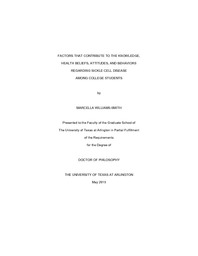
ATTENTION: The works hosted here are being migrated to a new repository that will consolidate resources, improve discoverability, and better show UTA's research impact on the global community. We will update authors as the migration progresses. Please see MavMatrix for more information.
Show simple item record
| dc.contributor.author | Williams-Smith, Marcella | en_US |
| dc.date.accessioned | 2015-07-31T22:10:17Z | |
| dc.date.available | 2015-07-31T22:10:17Z | |
| dc.date.submitted | January 2015 | en_US |
| dc.identifier.other | DISS-13155 | en_US |
| dc.identifier.uri | http://hdl.handle.net/10106/25098 | |
| dc.description.abstract | SCD and Thalassemia are considered the two major Hemoglobin Disorders, and have recently been declared a global health problem by the World Health Organization (WHO). Despite SCD being a global health issue, the United States (US) still focuses on treatment and management of the disease rather than prevention. The overall purpose of this study was to assess the factors that contribute to knowledge, health beliefs, and attitudes about SCD, and screening behaviors among college students to provide pertinent information for SCD prevention. A non-experimental, cross-sectional research design using a convenience sample of college students was used for this study. Descriptive statistics, such as frequency distributions and percentages were used to describe the sample. MANOVA was used to determine if there were any group differences in the knowledge, health beliefs, attitudes, and behaviors about SCD. Finally, linear and multiple regression analyses were conducted to determine the predictive value of gender, race/ethnicity, family history, and familiarity with SCD as it relates to the knowledge, health beliefs, attitudes, and behaviors about SCD. Regression analyses were also used to determine the strength of the relationship between knowledge, health beliefs, attitudes, and behaviors about SCD. An important finding from this study is that there was a significant relationship between knowledge, health beliefs, and attitudes regarding SCD even after controlling for demographic factors. Race/Ethnicity was the best predictor of knowledge about SCD. This finding highlights the importance of Universal SCD education and should be an important factor to consider in the development of prevention programs. Implications for SCD prevention using the Universal, Selective, and Indicative Prevention Framework are presented. | en_US |
| dc.description.sponsorship | Praetorius, Regina T. | en_US |
| dc.language.iso | en | en_US |
| dc.publisher | Social Work | en_US |
| dc.title | Factors That Contribute To The Knowledge, Health Beliefs, Attitudes, And Behaviors Regarding Sickle Cell Disease Among College Students | en_US |
| dc.type | Ph.D. | en_US |
| dc.contributor.committeeChair | Praetorius, Regina T. | en_US |
| dc.degree.department | Social Work | en_US |
| dc.degree.discipline | Social Work | en_US |
| dc.degree.grantor | University of Texas at Arlington | en_US |
| dc.degree.level | doctoral | en_US |
| dc.degree.name | Ph.D. | en_US |
Files in this item
- Name:
- Smith_uta_2502D_13155.pdf
- Size:
- 5.905Mb
- Format:
- PDF
This item appears in the following Collection(s)
Show simple item record


